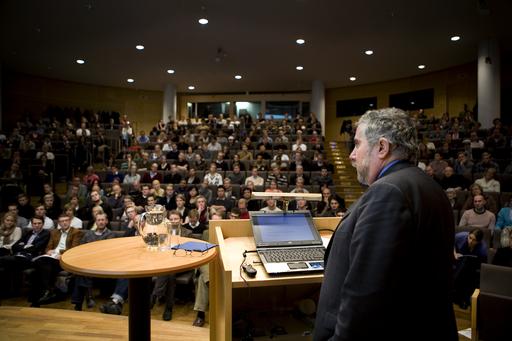The Tore Browaldh Lecture
Each year, the School of Business, Economics and Law hosts the Tore Browaldh Lecture. A prominent, invited lecturer highlights topics like the relationship between economics, economic theory or economic systems on the one hand and social attitudes, political systems and philosophy on the other.
In 1988, the Board of Directors at AB Volvo made a decision, by way of acknowledgement of Tore Browaldh's many years of service as a board member, to allocate funds to a foundation to be administered by the School of Business, Economics an Law at the University of Gothenburg. The purpose of this foundation should be to arrange a public lecture once a year, known as the Tore Browaldh lecture at the School of Business and Economics at Göteborg University. The first lecture took place in 1989.
Previous lecturers
2003 - Professor Nicholas F. R. Crafts: Globalization in History: a Geographical Perspective
2001 - Professor Nathan Rosenberg: University-Industry Relations and their Influence on the Competitiveness of Nations
Direktör Björn Stigson: Globalisering och företagens ansvar för miljö och social utveckling - World Business Council´s syn och roll
1999 - Jubilee lecture: Moral och omoral i det ekonomiska livet
- Professor Hans De Geer: Moralen i skandalen eller den vita vågen
- Direktör Leif Vindevåg: Etiska affärer - kan det löna sig?
- Panel discussion: Kan man lagstifta om etik i affärslivet?
1997 - Professor Saskia Sassen, Columbia University
Dr Sirkka Hämäläinen: The European Monetary Union ¿ Principles and Perspectives
Professor Assar Lindbeck: Den europeiska välfärdsstaten
Professor John H. Dunning: Some Paradoxes of the Emerging Global Economy: The Multinational Solution
Professor Christian Grönroos: Service och kundrelationer i företagens marknadsföring
Professor Paolo Cecchini: From the European Community to the European Union - The Enhanced Commitment of the Member States
Professor Peter Hall: The European City System
Professor Horst Albach: The Unification between East and West Germany - Problems of Economic Restructuring and Research. Approaches to Solve them.
1989 Sir Ralf Dahrendorf: Transitions. Politics, Economics and Liberty


Who was Tore Browaldh?
Dr Tore Browaldh was born in Stockholm in 1917. He worked as a finance attaché at the Swedish embassy in Washington in 1943 and as a secretary for the post-war commission at the Ministry of Finance from 1944 to 1945, while at the same time being affiliated to the Research Institute of Industrial Economics. He worked as a secretary for the Handelsbanken Board of Directors from 1946 to 1949, as a director at the Council of Europe in Strasbourg from 1949 to 1951, and as a deputy managing director for the Swedish Employers Confederation from 1951 to 1954. From 1955, he worked as the managing director at Svenska Handelsbanken until 1966, as chairman of the board from 1966 to 1978, as first vice chairman from 1978 to 1988, and as an honorary chairman from 1988 until his death in 2007.
Tore Browaldh received an honorary doctorate from the Royal Institute of Technology, Stockholm in 1967 and an honorary doctorate from Göteborg University in 1980. For many years, he was chairman of the board at AB Volvo, AB Industrivärden, Svenska Cellulosa AB, Svenska IBM AB, Svenska Unilever AB and Sandrews, and vice chairman of the Nobel Foundation. He was a member of the Unilever Advisory Board, IBM World Trade Corp. and the International Advisory Board of AB Volvo. He also wrote a number of books, including the autobiographies Gesällvandring (1976), Vägen vidare (1980) and Motlut och medvind (1984).
The Board of Directors at AB Volvo made a decision in 1988, by way of acknowledgement of Tore Browaldh's many years of service as a board member, to allocate funds to a foundation to be administered by the School of Business and Economics at Göteborg University. The purpose of this foundation shall be to arrange a public lecture once a year, known as the "Tore Browaldh lecture at the School of Business and Economics at Göteborg University", within the field of economics or social sciences, with priority for subjects which illustrate the relationship between economics, economic theory or economic systems on the one hand and social attitudes, political systems and philosophy on the other. The first lecture took place in 1989.